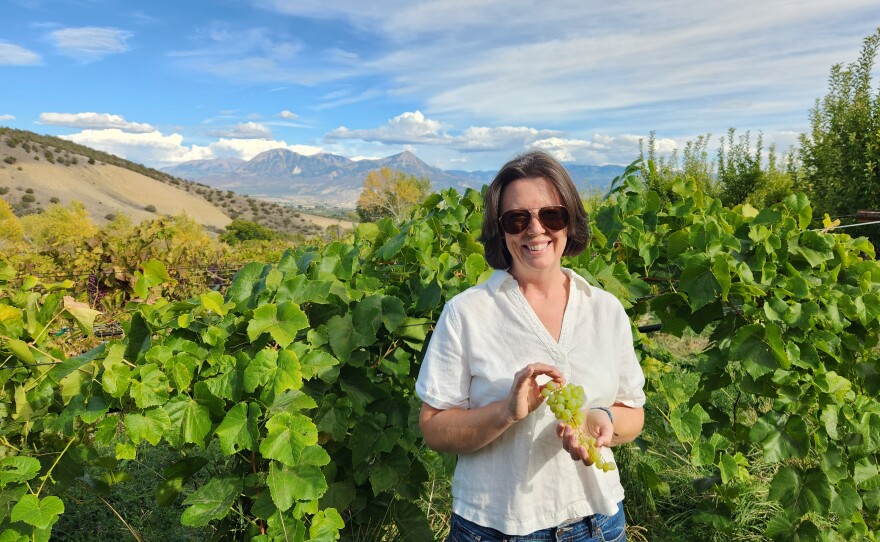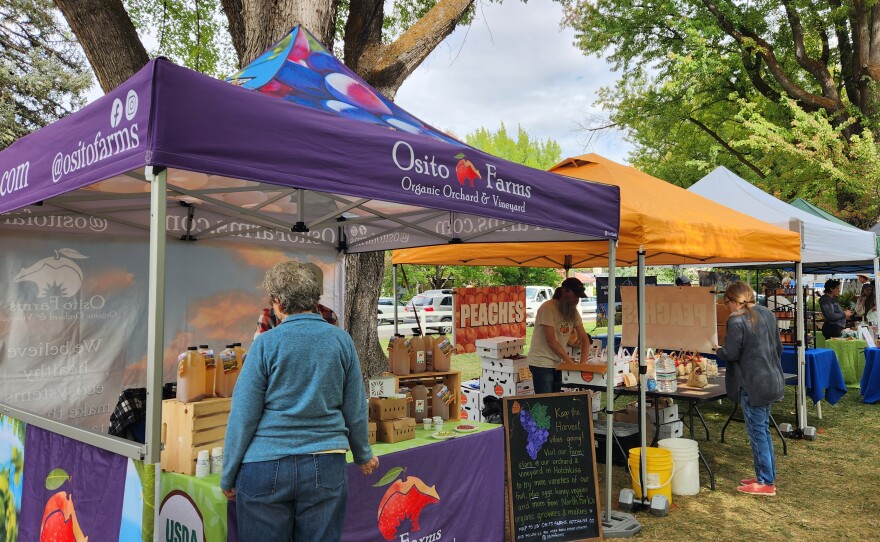On today’s KVNF Farm Friday we take you to Osito Farms just outside of Hotchkiss, Colorado on Rogers Mesa. Osito Farms participated in this year's Mountain Harvest Festival farm tours. The annual harvest celebration is held the last weekend in September in the North Fork Valley.
KVNF Senior Reporter Lisa Young visited with Tiffany Savarese beneath the shade of an old apple orchard while her husband Vince manned their tiny farm store.
OSITO FARMS
"Osito is Spanish for little bear. The orchard was named after the bears that come down out of the high country into the orchard in the fall to to fatten up. And we have a symbiotic relationship with them as best we can," said Savarese standing in one of the oldest apple orchards on Rogers Mesa.
Osito Farms is one of many organic certified orchard and vineyards through out the North Fork Valley in eastern Delta County.
"That's one of the most lovely things about the North Fork is that we are, I think, somewhat famous for our organic orchards, vineyards and farms. And that's a really special thing about our valley. So we're just one of many."
The farm is located on 3100 Road on Rogers Mesa, just west of Hotchkiss with a stunning view of the valley. Perched at nearly 6,200 feet, the air is crisp and clean. It's hard to believe that such a bountiful harvest is even possible at this elevation.
"We're the highest orchard up Rogers Mesa. So that's why we're the first stop for the bears when they come down out of the high terrain," said Savarese with a smile.
BEARS AND BEES
Osito Farms is bear welcoming and pollinator friendly supporting bees, birds, butterflies, and beetles. The creatures have free reign as they move pollen between flowers, crucial for plants to produce seeds and fruit. As, for the bears, Savarese is quick to point out that she makes plenty of noise while walking in the orchards especially during the peak bear visiting times.
"We're Bee Better Certified through the Xerxes Society. So that means that we engage in pollinator safe practices above and beyond our certification practices for organic," said Savarese just as a honeybee clipped my microphone.
"It's a it's actually a heavy lift and a lot of work above and beyond what we do for for the organic protocol. We're really proud of the work we do to support pollinators and beneficial insects here," Savarese said.
In order to be Bee Better Certified the high altitude orchard is required to set aside a percentage of its acreage for pollinators.
"The Bee Better program requires us to designate ten percent of our total acreage as permanent pollinator habitat. And so we've got acreage that's set aside. We don't cultivate it. It's not cropped. And we agree not to put any seeds or plants in that area that are non-native to this specific region and we do everything we can to support a balanced habitat for native pollinators in the area," Savarese said.
When some folks learn that Osito Farms is bear friendly they often ask why the couple would allow bears and other wildlife access to the orchard.
"We believe that a basically a balanced ecosystem includes not only beneficial insects and pollinators, but also the native wildlife from this area. So that's everything from bugs and then just go up from there. Everything from toads, birds, rodents and other wildlife. All the way up to the megafauna, like deer, mountain lion and bear. We're big believers in that," Savarese said, pointing out some recent bear droppings on the orchard floor.
"We believe that all of that wildlife is contributing to the soil diversity, which ultimately contributes to healthier trees and better tasting fruit. Permaculture is a really hot topic right now. A lot of folks will come in and ask us, 'oh, do you graze sheep? Do you do other permaculture practices?' And ultimately what we think we're doing here is kind of a wild permaculture," she continued.
So instead of bringing in non-native livestock and creating a permaculture environment, at Osito Farm the couple work hard to coexist along with the native flora and fauna and find a way to make that happen as a form of permaculture.
APPLE ORCHARD
As we walked through the apple orchard with its crop all but gone, Savarese proudly described the scene.
" So we're actually standing in my very favorite part of the orchard. These are old growth apple trees. These were planted before I was born. We're probably one of the few orchards left with full size apple trees. You can actually hear the life buzzing while we're out here. And these great big trees, it's really my favorite place to come walk when I'm not working, let alone when I am working."
She went on to describe the lush green cover crop laid out between the trees and beneath our feet.
"Its a custom mix for our orchard. So the goal in our orchard is to always have something blooming somewhere in the orchard for the pollinators. And so what we're seeing at this late point in the season is a lot of red clover pop up. And then in addition, we've got the orchard grass, which kind of knits together and helps us with weed control. We don't spray any chemicals for weed control in our orchard. So what we're looking at this really soft beautiful cover crop. It's a soft green grass that's actually providing a weed control by knitting together," said Savarese.
AGRITOURISM
As we spoke she pointed out the blooming of the clover as bees buzzed around seeking a place to land. As the day grew long, our conversation drifted to the topic of agritourism on the farm which includes farm tours, over night stays in a glamping tent and a new farm store.
" So at this point, I would say there's two things that we do regularly. Technically the Mountain Harvest Fest farm tours would also count. We've got locals who come and see us during the tours every year, which I love to see," said Savarese. "But throughout the season we do have a couple of glamping tents. So people can come and stay with us for a night or for the weekend and experience the orchard as guests."
Guest arriving at the farm typically park in front of a brightly painted building with beautiful artwork depicting a bear, fruit, flowers and humming birds.
"This is our second year of having the farm stand. Or we're starting to call it a farm store as it grows beyond just our fruit in there. So we're very excited about that. It's been it's kind of a community store. It's on the honor system. And folks really love coming in. They leave us notes, send us love. And this year we're really excited to become a farm stand that's actually supporting other North Fork growers," said Savarese as we made our way back to farm store to look around.











